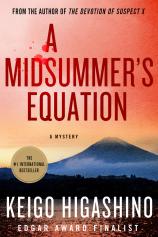A Midsummer's Equation
Review
A Midsummer's Equation
It has been too long since we last encountered Dr. Manabu Yukawa. The brainchild of prolific Japanese author Keigo Higashino, Yukawa is an eccentric physics professor who has acquired the nickname “Detective Galileo” for providing occasional and ofttimes reluctant assistance to law enforcement when a serious and baffling crime has occurred. To my knowledge, there have been five books published in the series to date, with the newly minted A MIDSUMMER’S EQUATION being the third to be seen in the United States thanks to the stalwart translation efforts of Alexander O. Smith. This is perhaps the most complex of the mysteries seen on this side of the Pacific thus far, one that challenges Galileo’s abilities to the hilt.
"The Detective Galileo mystery series is one of the smartest and most complex out there at the moment, but you never get lost in the narrative, thanks to Higashino’s straightforward storytelling and Smith’s translation, which is considerate of the reader while staying true and accurate to the source material."
The locus of A MIDSUMMER’S EQUATION is Hari Cove, a fictional resort and vacation complex that had once been quite popular --- and prosperous --- but is now teetering toward oblivion. Hari Cove’s present dilemma is a common one in this age. It has been decided that the once-pristine vacation spot is now ideal for an underwater mining operation. Such an endeavor, if carried out, will ruin what was once a jewel, yet it will also provide jobs and stimulate the economy, which otherwise will have no hope. Yukawa has come to Hari Cove to address a conference concerning the planned operation, which understandably has divided the town. A vocal panel discussion on the matter fails to really settle anything, other than to make the divisions between the sides all the more deeper.
The morning after the panel, a participant in the conference is found dead at the bottom of one of the local cliffs. At first it appears to be an accident, a death by misadventure, if you will, given that the deceased was a stranger to the area and seemed to have fallen off the cliff while walking in the dark. It develops, though, that the untimely death is the result of carbon monoxide poisoning as opposed to trauma from the fall. Yukawa is entreated to put on his Detective Galileo hat to assist the police in determining what happened and to bring the murderer to justice. Even though Yukawa is reluctant to do so, he also finds himself drawn into the mix. As readers of the earlier books in the series know, Yukawa cannot resist a puzzle, especially one that involves a crime of the magnitude of murder.
Yukawa’s occupation exists in a world of replicable results, deduction and logic. While his sidebar work assisting the police relies on those factors as well, he is additionally blessed with a highly developed, unscientific sense of instinct that allows him to make connections between a number of seemingly disparate points of information, enabling him --- with a bit of prodding here and a bit of force there --- to arrive at the truth, or something like it. As Yukawa notes near the end of A MIDSUMMER’S EQUATION, not every mystery can be unraveled with modern science. Not at first, anyhow. Yukawa looks in some unexpected places in unexpected ways, and, as one might expect, uncovers some unexpected answers.
The Detective Galileo mystery series is one of the smartest and most complex out there at the moment, but you never get lost in the narrative, thanks to Higashino’s straightforward storytelling and Smith’s translation, which is considerate of the reader while staying true and accurate to the source material. It is not light reading by any means, but deserves a place on your reading list.
Reviewed by Joe Hartlaub on February 26, 2016




